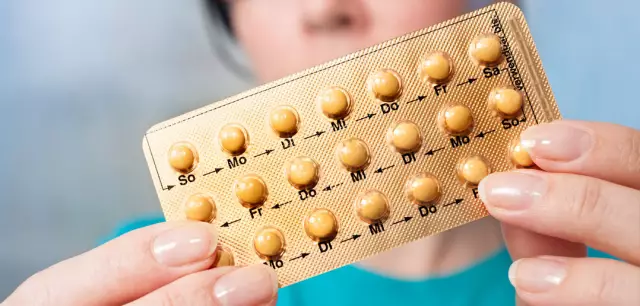- Author Rachel Wainwright wainwright@abchealthonline.com.
- Public 2023-12-15 07:39.
- Last modified 2025-11-02 20:14.
Proginova
Proginova: instructions for use and reviews
- 1. Release form and composition
- 2. Pharmacological properties
- 3. Indications for use
- 4. Contraindications
- 5. Method of application and dosage
- 6. Side effects
- 7. Overdose
- 8. Special instructions
- 9. Application during pregnancy and lactation
- 10. Use in childhood
- 11. In case of impaired renal function
- 12. For violations of liver function
- 13. Drug interactions
- 14. Analogs
- 15. Terms and conditions of storage
- 16. Terms of dispensing from pharmacies
- 17. Reviews
- 18. Price in pharmacies
Latin name: Proginova
ATX code: G03CA03
Active ingredient: estradiol valerate (estradiol valerate)
Producer: Delpharm Lille (France)
Description and photo update: 2019-20-08
Prices in pharmacies: from 521 rubles.
Buy

Proginova is an estrogenic anti-climacteric drug.
Release form and composition
The dosage form of Proginova's release is dragee (21 pcs. In blisters, 1 blister in a cardboard box).
The composition of 1 tablet contains:
- Active substance: estradiol valerate - 2 mg;
- Auxiliary components: montanglycol wax - 0.075 mg, lactose monohydrate - 46.25 mg, talc - 2.4 mg, corn starch - 26.2 mg, povidone 25,000 - 3 mg, magnesium stearate - 0.15 mg, macrogol 6000 - 3.719 mg, crystalline sucrose - 33.54 mg, povidone 700 000 - 0.323 mg, talc - 7.104 mg, precipitated calcium carbonate - 14.572 mg, glycerol 85% - 0.205 mg, indigo carmine (E132) - 0.051 mg, titanium dioxide (E171) - 0.411 mg.
Pharmacological properties
Pharmacodynamics
The hormone estrogen (in the form of estradiol valerate) is part of Proginova, which in the human body turns into natural 17β-estradiol. During the period of therapy, ovulation is not suppressed. The drug practically does not affect the production of hormones in the body itself.
Estradiol valerate in women compensates for the lack of estrogen after menopause and is necessary to ensure effective treatment of psychoemotional and vegetative climacteric symptoms (in the form of hot flashes, increased sweating, sleep disturbances, irritability, increased nervous excitability, palpitations, headache, dizziness, cardialgia, decreased libido pain in muscles and joints), as well as involution of the skin and mucous membranes, especially the mucous membranes of the genitourinary system (in the form of dryness and irritation of the vaginal mucosa, urinary incontinence, pain during intercourse).
HRT (hormone replacement therapy) with an adequate dose of estrogen contained in Proginova helps to reduce bone resorption and delay / stop bone loss in postmenopausal women. Long-term use of HRT has been shown to reduce the risk of peripheral bone fractures in postmenopausal women. After the discontinuation of HRT, the rate of bone loss is comparable to that characteristic of the period immediately after menopause. It has not been proven that as a result of the use of Proginova, it is possible to restore bone mass to the premenopausal level.
HRT also has a beneficial effect on the collagen content in the skin and its density and helps to slow down the formation of wrinkles.
Women with an unremoved uterus during the period of taking Proginova are advised to additionally use gestagen for at least 10 days in each cycle. This reduces the likelihood of endometrial hyperplasia and the associated risk of adenocarcinoma in women in this group.
Taking Proginova helps to reduce the level of total cholesterol, LDL cholesterol and HDL cholesterol (low and high density lipoproteins), as well as an increase in triglycerides. The addition of a gestagen may slightly inhibit the effect of estradiol on metabolism.
The metabolic effects of HRT are generally assessed as positive. It is believed that Proginova reduces the risk of cardiovascular disease in postmenopausal women.
Pharmacokinetics
After oral administration, estradiol valerate is rapidly and completely absorbed. During absorption and the first passage through the liver, the steroid ester is cleaved into valeric acid and estradiol. In this case, estradiol undergoes significant further metabolism, for example, into estriol, estrone sulfate and estrone (weaker estrogen). Bioavailability after oral administration is approximately 3% estradiol. Food intake does not affect this indicator.
C max (maximum concentration of the substance) of estradiol in serum is about 30 pg / ml, the average time to reach it is from 4 to 9 hours. 24 hours after taking Proginova, the serum level of estradiol decreases by about 2 times.
Estradiol binds to albumin and SHBG (globulin that connects sex hormones). The free fraction of estradiol in serum is approximately 1-1.5%, and the fraction of the bound SHBG substance is from 30 to 40%.
The apparent V d (volume of distribution) of estradiol after a single intravenous administration is approximately 1 l / kg.
After hydrolysis of estradiol valerate, the substance undergoes biotransformation in the same ways as endogenous estradiol. Estradiol is metabolized mainly in the liver, partly in target organs, kidneys, intestines and skeletal muscles. These processes are accompanied by the formation of estrone, catechol estrogens, estriol, as well as glucuronide and sulfate conjugates of these compounds. All of them have significantly less or no estrogenic activity.
A certain amount of estradiol is excreted in the bile and undergoes intestinal-hepatic recirculation. Excretion of metabolites occurs mainly in the form of glucuronides and sulfates in the urine.
The serum concentration of estradiol in the blood after repeated use is approximately 2 times higher than after a single dose. On average, this indicator can vary from 30 (minimum) to 60 (maximum) pg / l. The concentration of estrone sulfate is approximately 150 times higher than that of estradiol, and estrone is approximately 8 times higher. After the end of therapy, the concentrations of estrone and estradiol return to baseline values within 2-3 days.
Indications for use
- Hormone replacement therapy (HRT) against the background of the following diseases / conditions: climacteric disorders, involutive changes in the skin and urinary tract, depressive conditions in the menopause, symptoms of estrogen deficiency due to sterilization or natural menopause;
- Postmenopausal osteoporosis (prevention).
Contraindications
- Breast cancer (confirmed or suspected);
- Vaginal bleeding of unknown etiology;
- Liver tumors (benign / malignant), currently or in the presence of anamnestic data;
- Hormone-dependent precancerous diseases or hormone-dependent malignancies (confirmed or suspected);
- Severe hypertriglyceridemia;
- Acute arterial thrombosis or thromboembolism (stroke, myocardial infarction);
- Severe liver disease;
- High likelihood of thrombosis (venous and arterial);
- Deep vein thrombosis (with exacerbation), thromboembolism at present or in the presence of anamnestic data;
- Lactose intolerance, congenital lactase deficiency, isomaltase / sucrase, glucose-galactose malabsorption;
- Pregnancy and lactation;
- Age under 18;
- Hypersensitivity to the components of Proginova.
If any of the described conditions / diseases develop for the first time while taking Proginova, you must immediately interrupt therapy and consult a specialist.
Instructions for use of Proginova: method and dosage
Proginova should be taken orally with a small amount of liquid.
If the uterus is not removed, and the woman is still menstruating, therapy is started in combination with some progestogen in the first 5 days of the menstrual cycle. With very rare menstruation, as well as during the postmenopausal period, you can start taking Proginova at any time after excluding pregnancy.
The recommended dosage regimen is 1 tablet a day. With cyclic HRT after 21 days (at the end of the package), you can take a break in taking the drug (usually for 7 days or less), with continuous hormone replacement therapy, Proginova is taken daily without interruption.
With cyclic combined HRT, gestagen is recommended to be taken every 4 weeks for 10-14 days, with continuous combined HRT - simultaneously with each estrogen pill.
It is recommended to take Proginova at the same time, but the time of day has no effect on the effectiveness of the drug. If you skip taking a single dose, pills should be taken in the next 12-24 hours. If therapy was interrupted for a longer period, bleeding may develop.
Side effects
Possible adverse reactions (≥1 / 10 - often; ≥1 / 10 00 and <1/10 - infrequently; <1/1000 - rarely):
- Central nervous system: often - headache; infrequently - dizziness; rarely - migraine;
- Reproductive system: often - uterine, vaginal bleeding, incl. smearing bleeding; infrequently - pain in the mammary glands, increased sensitivity of the mammary glands; rarely - a symptom complex of premenstrual syndrome, dysmenorrhea, breast enlargement, vaginal discharge;
- Cardiovascular system: infrequently - palpitations;
- Immune system: infrequently - hypersensitivity reactions;
- Musculoskeletal system: rarely - muscle spasms;
- Digestive system: often - abdominal pain, nausea; infrequently - dyspepsia; rarely - bloating, vomiting;
- Skin: often - rash, itching; infrequently - erythema nodosum, urticaria; rarely - hirsutism, acne;
- Metabolism: often - change (decrease or increase) in body weight;
- Organ of vision: infrequently - visual impairment; rarely - intolerance to contact lenses (discomfort when wearing them);
- Psyche: infrequently - decreased mood; rarely - anxiety, change (increase or decrease) in libido;
- General: infrequently - edema; rarely, weakness.
In rare cases, when taking Proginova, it is possible to develop thromboembolism and deep vein thrombosis, as well as benign, and even less often - malignant liver tumors (in some cases, this led to intra-abdominal bleeding, which poses a threat to life).
With prolonged monotherapy, the likelihood of endometrial cancer or hyperplasia increases. When taking Proginova for several years, an increase in the relative risk of breast cancer has been established.
In some women, taking the drug can lead to the development of gallstone disease.
There are limited data indicating an increased likelihood of dementia in patients starting Proginova at the age of 65 years.
In some cases, chloasma may develop, especially in women with a history of chloasma during pregnancy. In the presence of hereditary forms of angioedema, Proginova can cause or worsen the signs of angioedema.
Overdose
With an accidental intake of Proginova at a dose that is many times higher than the daily therapeutic dose, the risk of developing serious acute adverse reactions has not been identified.
Possible symptoms: vomiting, nausea, vaginal bleeding.
Therapy: symptomatic. There is no specific antidote.
special instructions
In the presence of several risk factors for the development of thrombosis or a high degree of severity of one of the risk factors, it is necessary to take into account the likelihood of mutual enhancement of the action of these factors and the prescribed therapy on the development of thrombosis. The total value of the existing risk factors in such cases increases. If there is a high probability of risk, Proginova should not be taken.
Before prescribing a treatment course, as well as regularly during therapy (at least once every six months), it is necessary to carry out the necessary studies, including examination of the mammary glands, gynecological examinations, blood pressure measurement and others, in the presence of prolactinoma - a medical examination (including periodic determination of the concentration of prolactin).
Women need careful medical supervision if they have the following conditions / diseases:
- Endometriosis (currently or with a history of indications);
- Fibroids of the uterus;
- Jaundice during a previous pregnancy or previous use of sex hormones;
- Epilepsy;
- Diseases of the liver or gallbladder (the appointment of Proginova after hepatitis is possible not earlier than six months later (after normalization of liver function indicators));
- Arterial hypertension;
- Diabetes;
- Chloasma currently or in the past (prolonged exposure to the sun or ultraviolet radiation should be avoided);
- Chorea;
- Systemic lupus erythematosus;
- Benign diseases of the mammary glands (mastopathy);
- Migraine;
- Bronchial asthma;
- Porphyria;
- Increased levels of triglycerides in the blood;
- Otosclerosis;
- Increased risk of venous thrombosis (the risk increases with age, as well as with overweight, varicose veins, family history of thrombosis).
The risk of deep vein thrombosis may be briefly increased due to surgery, prolonged immobility, or serious injury. When planning surgical interventions or operations, you must inform the doctor in advance about taking the drug (4-6 weeks in advance).
For the prevention of heart attack or stroke, Proginova should not be used.
During therapy, it is necessary to take into account the likelihood of developing the following diseases:
- Endometrial cancer: The risk increases with long-term monotherapy. With a preserved uterus, the combined use of Proginova with gestagens is necessary. With frequent irregular or breakthrough bleeding, you should consult a specialist;
- Breast cancer (BC): The relative risk increases with the duration of estrogen monotherapy. During the first few years after stopping HRT, the increased risk gradually decreases to normal levels. HRT can increase the mammographic density of the mammary glands, which in some cases can negatively affect the X-ray detection of breast cancer (it is possible to use other research methods for screening for breast cancer);
- Ovarian cancer: with prolonged (more than 10 years) estrogen replacement therapy (ERT), the risk of developing ovarian cancer slightly increases;
- Liver tumors: the connection with HRT has not been proven. If you develop unusual sensations in the upper abdomen that do not go away for a short period of time, you should consult a specialist.
If one of the following conditions appears, it is necessary to interrupt therapy and consult a doctor:
- Exacerbation of the existing migraine;
- First-onset migraine attack (characterized by nausea and throbbing headache preceded by visual impairment);
- Sudden impairment of hearing or vision;
- Any unusually frequent or unusually severe headaches;
- Inflammation of the veins (phlebitis).
Also, the reason for stopping taking Proginova is thrombosis or suspicion of it. Signs of possible thrombosis include coughing up blood, loss of consciousness, unusual pain or swelling in the legs or arms, and sudden shortness of breath.
In the event of jaundice or pregnancy, therapy should be discontinued.
Before conducting laboratory tests, it is necessary to warn the doctor about taking Proginova, since therapy can affect the results of some of them.
With a contraceptive purpose, Proginova should not be taken (it is recommended to use non-hormonal methods, except for temperature and calendar). In case of suspicion of pregnancy, the drug should be suspended (until it is excluded).
Women over the age of 65 should consult a specialist before taking Proginova (due to data indicating an increased likelihood of developing dementia).
Application during pregnancy and lactation
According to the instructions, Proginova is not prescribed during pregnancy / lactation.
If pregnancy is detected during therapy, the drug is canceled.
Pediatric use
Proginova therapy is contraindicated in patients under 18 years of age.
With impaired renal function
There is no need for dose adjustment in patients with impaired renal function.
For violations of liver function
Contraindications to taking Proginova are benign / malignant liver tumors, including a burdened history, and severe liver disease.
Drug interactions
Before starting HRT, you should interrupt the use of hormonal contraceptives. If necessary, a woman is prescribed non-hormonal contraceptives.
With the simultaneous use of Proginova with certain drugs / substances, the following effects may occur:
- Alcohol: increased levels of circulating estradiol;
- Some types of antibiotics (tetracycline and penicillin groups): decrease in estradiol levels;
- Drugs that induce liver enzymes (some anticonvulsant and antimicrobial drugs): an increase in the clearance of sex hormones and a decrease in their clinical effectiveness;
- Oral antidiabetic agents, insulin: change in the need for them (due to the effect of HRT on glucose tolerance);
- Substances that are heavily conjugated (paracetamol): increase the bioavailability of estradiol.
Analogs
Proginova analogues are: Ethinylestradiol, Folliculin, Ovipol Clio, Sinestrol, Estrovagin, Elvagin, Kolpotrofin, Esterlan, Pauzogest, Estrokad, Klimen, Ovestin.
Terms and conditions of storage
Keep out of reach of children under normal conditions.
The shelf life is 5 years.
Terms of dispensing from pharmacies
Dispensed by prescription.
Reviews about Proginov
Reviews about Proginova when using this drug in women during menopause are mainly positive. It is noted that the drug effectively relieves symptoms characteristic of changes in hormonal levels.
In the case of the appointment of Proginova when planning pregnancy, reviews have both a positive and negative connotation. Evaluation of the therapeutic effect and tolerability of the drug is individual.
The price of Proginova in pharmacies
The approximate price for Proginova (21 tablets) is 368-562 rubles.
Proginova: prices in online pharmacies
|
Drug name Price Pharmacy |
|
Proginova 2 mg dragee 21 pcs. 521 RUB Buy |
|
Proginova dragee 2mg 21 pcs. 551 r Buy |

Maria Kulkes Medical journalist About the author
Education: First Moscow State Medical University named after I. M. Sechenov, specialty "General Medicine".
Information about the drug is generalized, provided for informational purposes only and does not replace the official instructions. Self-medication is hazardous to health!






